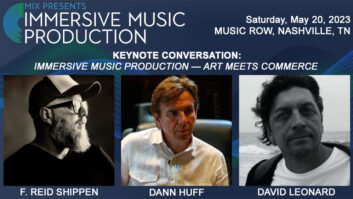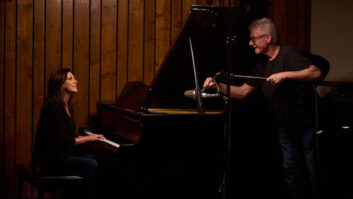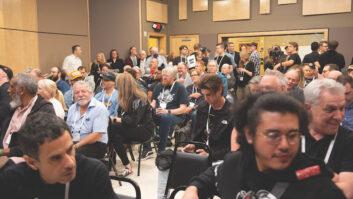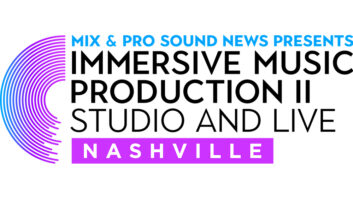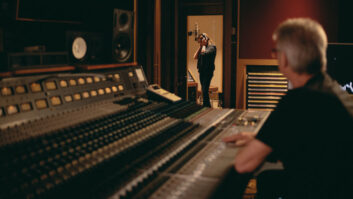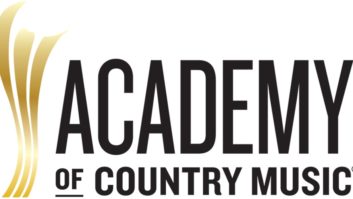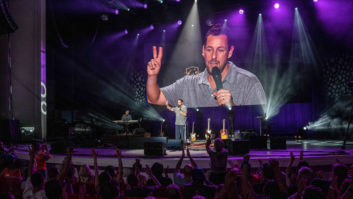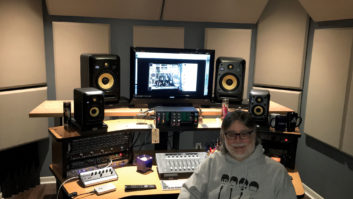Two years ago, Dann Huff was just making a name for himself as a producer in Nashville. His credits included Faith Hill, Lonestar and newcomers SHeDaisy, as well as two Megadeth albums. What he couldn’t have predicted was that Lonestar and SHeDaisy would become award-winning acts selling millions of albums. As their careers took off, so did Huff’s. Today, he ranks among Music Row’s most in-demand producers, and his resumé lists Bryan White, Chely Wright, Rebecca St. James, Billy Ray Cyrus, Collin Raye, Trace Adkin, and follow-up efforts from Lonestar and SHeDaisy.
Huff’s father, Ronn, was a sought-after arranger on the cutting edge of Nashville’s contemporary Christian music scene. As a youngster, Dann would accompany him to sessions and, to this day, cites his father as his first influence. At the age of 9, Huff began playing guitar, and, by the time he reached his teens, he was “obsessed” with music. His natural talent led him to session work, which, in turn, took him to Los Angeles. There, he played on recordings by Whitesnake, Celine Dion, Michael Jackson, Madonna, Michael Bolton, Whitney Houston, Amy Grant, DC Talk, Wang Chung, Fine Young Cannibals, Barry Manilow, The Temptations, Chaka Khan, O’Jays, Smokey Robinson… “Whatever was going on in the pop world in the 1980s, I played on at least one song by everybody,” he says.
Eventually, the desire to be in a band took over, and he formed the rock group Giant, with his younger brother David on drums. (Their youngest brother, Ronn, is also a musician, but not professionally.) Although Giant was well-received by critics, they never achieved the level of success they deserved. Huff returned to Nashville and the insular world of sessions, playing on hits by artists such as Clint Black, Faith Hill, Tim McGraw, Reba McEntire and Shania Twain, whose husband, producer “Mutt” Lange, encouraged Huff to try production.
Huff’s career has expanded into Huff Brite LLC, a production company he runs with his partner, producer/publisher Mark Brite, and their A&R rep, Darryl Franklin. Also involved are Jeff Balding and longtime associate Mike Griffith. In conjunction with Sony Nashville, Huff Brite is a burgeoning imprint that Huff says allows him to find and develop new artists. When Mix caught up with Huff and his trusty engineer Balding, they were at Emerald/Masterfonics mixing SHeDaisy’s sophomore effort, slated for a 2002 release. (For more on the project, see sidebar page 66.)
How did you establish yourself as a producer?
The first thing I did was Chris Ward [One Step Beyond], which I co-produced with James Stroud. I was nervous. I’d known James since I was 18, and told him I wanted to produce. He hired me on a lot of records, let me do overdubs. So, I co-produced Chris with him. There were good moments on that record. Then I did one I’m extremely proud of, John and Audrey Wiggins’ second album, The Dream.
The first thing you learn when you produce is, it’s not the quality but a lot of luck — catching the right song at the right time, and great songs don’t always catch. The Wiggins’ album was the first thing I did myself, and the label let them go after two singles. Then I got a call to do Megadeth. Mutt and Shania recommended me to Faith [Hill], and because of that she looked at me as a producer, because the label sure-shootin’ wasn’t looking at me as one! They don’t consider you a producer until you’re successful, and how do you get successful? Produce a couple of hits and you’re a genius! In the midst of that, I did two records with John Schlitt, a contemporary Christian artist, and co-produced them, so it was a building thing. Faith hit, so I did Lari White, who had a nice hit, and then SHeDaisy and Lonestar.
You’ve come a long way in the two years since we last spoke. To what do you credit this, other than talent?
It’s hard work and a lot of luck. Talent has something to do with it, but popular music… I’ve done stuff in the last two years as good as I can do, and it absolutely flopped. It’s the weirdest thing. Who knows what will go or not? You basically burrow your head down and hope things hit, and when they do, everyone thinks you’re brilliant. But when they don’t…
Nashville’s two breakthrough bands in the past year, Lonestar and SHeDaisy, were both your productions. Is that a coincidence?
I don’t know. You can call it a lot of different things. When you win, you accept and try not to define it too much. Yeah, I’m a large part of it, but without the combination of each act… They’re very different groups. SHeDaisy writes or co-writes everything. With Lonestar, we find songs, but with this new record, Richie [McDonald, lead vocalist] wrote the first single, “I’m Already There,” on the road, and it’s going to break wide open. We’ve found out who they are, who their audience is, what works and what doesn’t. I’ve done a couple of records in the last two years that you heard nothing about. Shane Minor was one of the best records I’ve ever done and why it didn’t work, I can’t tell you. I believe in him enough to do it again. I thought, “This is too good to not work.” That’s the risk you take as a producer.
I remember you telling me that the first time you heard Lonestar, you thought, “That’s not me; I wouldn’t be good at doing this.”
I never thought in a million years that I would be a country producer. It’s not above or beneath me; it’s just not my roots. The critics here say I shouldn’t be. They have a field day with me. For the most part, critically, I’m to be avoided like the plague. If I listened to the critics, I’d have moved by now.
What makes you a good producer?
I like what I do. I’m hired by the artist to fulfill their vision musically, and whatever it takes to get them from point A to B is fun and compelling. If they’re happy, then I’ve done my job. Also, I have a lot of pride in what I do and I work to make myself happy, too. Whether our tastes coincide is not important. I have to define their tastes and make the best album I can. It’s like battling with myself every time — how can I make it better, extract one more drop of blood? Once you’ve given your best, you walk away saying, “You’ve done good.” I would love for the critics to love what I do, sure. Music has been a part of my life since I was a child. I don’t know how not to be a musician. I love music. But to be in a position of doing something somebody else doesn’t like, you’re getting into politics and religion! It’s best to get in the studio, do the work and get the heck out of there — and develop a really tough, thick skin. Some people I’ve read rip into me, yet I enjoy their writing! It’s stupid what they do, but I guess if you’re selling records, you’re fair game.
How would you define the term “producer?”
The record company gets together with the artist, they need a record, they hire a producer [who is] basically responsible to make sure that it happens within a budget and a certain amount of time. From that point on, it’s anybody’s guess. Project to project, I try to see what’s needed. People call me for musicality. Some producers are facilitators who get the right players and document it. Some producers are hands-on and use players as an extension of what they do. I tend to go that direction, but I don’t pull the reins. As a musician, I worked for great producers of all types and learned from the best: James Stroud, Mutt Lange, Quincy Jones. There’s no right or wrong way to do it. I like selling records, but I like making records the way I want them to sound. You define it as you go; it’s basically open.
When did your phone really start ringing?
After the first couple of hits. After my first hit with Faith, I began being taken seriously, then Lonestar really hit and then SHeDaisy, and I thought, “Maybe.” As the hits trickle in, it validates you more. Last year was nonstop, and I’ve been fortunate to be able to turn down work, which is important, because if I took everything offered, I would be divorced and dead — and not necessarily in that order! I’d rather not be either! Sherri and I have been together 19 years and the hardest thing is to maintain a family life as a husband and father. At a certain point, enough is enough, because if you creatively take on too much, and at times I’ve taken on way more than I should have, you’re not fresh or able to give 100 percent.
Has it become more of a job?
In some ways, but it was becoming a job to play guitar. Producing is a job, and I feel the responsibility but I love it. I love the thought of having final say and the responsibility of making something. The only drag is, if I’m wrong, it hurts someone’s career. I like the variety and styles I get to do. They’re all different and exciting in their own ways.
How do you know when it’s right?
You don’t. You guess. It’s all subjective. I’m looking for soul. You want dynamics and feeling, whether you’re playing at 150 dB or not, and you have to be willing to go with your gut, because there’s no handbook that goes with this. Music, writing, anything creative means you do it until something hits you.
I’m looking for soul. You want dynamics and feeling, whether you’re playing at 150 dB or not, and you have to be willing to go with your gut, because there’s no handbook that goes with this.
Equipment by itself means nothing. Some of the greatest records were made on 4-track. Equipment is just there to facilitate creativity. I’ve heard records lately that are done in teeny home studios and they’re great. Technology moves in leaps and bounds; people can record clean records in their kitchens. With a serious mind, gut feeling and intuitive sense about what appeals to others, you don’t need half a million dollars. As a guitar player, I never knew much about guitars and amps, just what sounded good to me.
I’m not trying to undersell it; that’s just the way I’ve always looked at it. You make a decision about compression, textures, changing preamps, and I can’t tell you a spec sheet, but I can feel something and say, “We need to move in another direction. Can you give me some alternatives and I’ll make a selection?”
Pro Tools is my instrument. Between Jeff and myself, we have three systems running continuously. I have one at the house so I can work and have a family life, and with the advent of all these plug-ins, there are no set rules. They’ve changed the way we do everything. I fumble around and find little things to enhance what I do. The main thing is not to do it the same way — to force yourself to think differently from a recording and musical standpoint.
You’ve remained very loyal to Emerald/Masterfonics as your primary workplace.
Honestly, it’s for no reason other than our relationship. I don’t care if we record in a warehouse, as long as there is a clean sound. I like recording in different places, I like being diverse and I work at my house, so the only thing I care about is having Jeff with me. Part of my job is to make judgments, but he’s so serious and so good that I know at the end of the day that whatever is on tape will be solid, because he makes it work. Music Row, as you know, is like your backyard. Everything is close together. Masterfonics has become the Emerald complex, with six or eight studios scattered. They have three buildings, the best coffee in town and the tracking facilities are great.
After making such successful albums with Lonestar and SHeDaisy, how do you repeat what worked but still make it new?
It’s different in the way we record a song, not having the same musicians, always trying to infuse something different in everything we do. First, we ascertain what’s working and keep the elements of that, but not be so repetitious that we don’t hit new ground. Jeff is always figuring the greatest new ways to get sounds, little “in particulars” that add up to something different, down to the way we assemble all the pieces on the record and connect it to what you’re doing. Especially if the first one was successful, then it’s everything and nothing the second time. It’s a weird situation. You don’t want it to sound like a production line; you don’t want to be guilty of using the same things again, but if it sounds good, you use it. It’s like putting together a jigsaw puzzle. You know what sounds good in your mind and where you want it to end up, but if the conclusion is not engraved in stone and you have a little flexibility, it makes it fun and interesting, and you find different things you didn’t know existed. That comes from listening to what people say in their ideas and on their instruments.
Let’s talk about making the new SHeDaisy record.
We started tracking at the place where we tracked their first record, the Bennett House, in Franklin. There’s a historical landmark there, the town square, a lot of houses that were built 150 years ago, and this is one of them. Keith Thomas, an award-winning producer, bought it five or six years ago and put in his own room. We used different rooms [in the house]; we did drums in the living room. There are two control rooms. We used Keith’s room this time and then went straight into Euphonix for the first set of tracks and integrated with Pro Tools more than not. We overdubbed at Emerald and at my house — Pro Tools is the constant at Emerald — and mixed at Emerald. Jeff evolves with every project; there aren’t enough good things I can say about him. He gets hungry and every six months, it is, “That stuff stinks; I’m starting from scratch.” He’s really come on as a mixer. He’s always been one of the best tracking engineers this town has seen.
You once told me, “If being a great producer means being an ass, I’d rather be second-rate.” Is that part of the reason why your phone is still ringing?
I think that plays into it, because it’s a people business. You’re dealing with personalities, and with every personality you take on their likes and dislikes, which may not coincide with yours. The only likes that matter are those of the people you’re working for. We all have egos, but I always know when to stop and take on the interest of the artist. Somebody says, “I don’t like the way you did that with so-and-so. I don’t want it on my record.” You go, “Okay.” You’re family with that person for a while, and you’re bringing those babies out.
Do you have a dream session?
No. I don’t know if it’s because I concentrate on what’s happening now. I truthfully haven’t thought in those terms. I had more dreams when I was younger. Now, I think in terms of improving. I’d like hit records — that means a lot to me — but hits that are real musical that I can look back on and be proud of. I played on so many hits that were horrible, disposable. On the other hand, I’d settle for those hits, too — that’s how you keep your job!
Okay, I’d like to produce U2. When hell freezes over, that will happen, but that would be the trip, because they are one of my favorite bands in history.
Elianne Halbersberg is a freelance writer.
COMING SOON FROM SHEDAISY
Here’s what Dann Huff’s engineer Jeff Balding has to say about the sessions for SHeDaisy’s upcoming release: “We recorded at Emerald A, the smaller room, a little bit different sound. A lot of the tracks, we do at The Tracking Room at Emerald. The 60 percent natural compression in the room sounds great. SHeDaisy’s first set of tracks were done straight into the Euphonix R1 hard disk recorder. The rest of the record was [through] A/D converters and tracked straight to Pro Tools. We use Pro Tools for compression and effects instead of outboard gear.
“We tracked first at the Bennett House: It’s a good room with great character. When you hear the drums, you know where they were cut. We pushed the faders up, and it sounds great without doing anything. [SHeDaisy’s] first album [The Whole SheBang] was cut there, so it made sense to go back. At Emerald, the overdubs are on [SSL] G-Plus to overdub, 4k with Ultimation to mix. Dann and I have Pro Tools, and we trade files back and forth, double duty. So I get the sound up and get him going. Then I go out and do the editing on Pro Tools. We get quite a bit done that way.”
— Elianne Halbersberg
